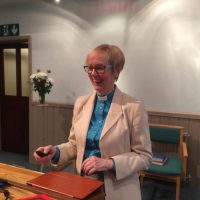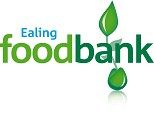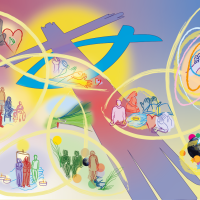Reflection April 26th Revd Sue McCoan
We are a month into the lockdown now. We are over the initial shock, the sudden change of the way we live, shop, work and worship.
It’s been tiring enough just keeping up. But now we have time to adjust, to look around, to draw breath. We hear encouraging news, that we seem to be hitting the peak of the crisis, but we are also faced with the sobering reality that this change to our lives is not going to be over any time soon. There may be gradual easing, in some places, for some people… but restrictions on social gatherings are likely to go on into the summer, festivals are being cancelled… things we looked forward to are vanishing before our eyes.
Holidays can be rebooked, or refunded; festival organisers are holding tickets over to next year; but not everything can be so easily rescheduled. This week I spoke to someone, not from church, who said she didn’t know when she would see her grandchildren again. At this stage, it would be very easy to lose heart, and even hope.
We are not alone. This takes us straight to the heart of our bible reading. Two weeks on from Easter, we are still dwelling on Easter Sunday evening. Last week, we heard from John’s gospel about the disciples who stayed in Jerusalem. This week we read from Luke about another two followers, equally devastated by Good Friday and the bizarre reports of the empty tomb, and who have given up. They have lost heart and lost hope, and they are going home.
Bible reading Luke 34:13-27
We can imagine the conversation the two disciples were having. How can it have gone so wrong? We so much hoped that this Jesus was the one who would save Israel – and now he can’t save anything because he’s dead! And, with that, maybe further questions – what if we got it wrong – what if we were fooled? What if it was all a con, and we fell for it? They look back, over the events of last week, over the last two or three years – what made us follow? were there signs we missed?
It’s like reading a detective novel, and you get to 20 pages before the end and you still don’t know who’s actually done it, or how or why. So you go back and piece together what you know, and see if you can work it out.
The two can’t work it out. The stranger who joins them doesn’t tell them the answer. Instead, he listens to all they have to say, and then gently shifts their thinking. OK, you know this has happened, this stuff that’s right in front of you… now, what else do you know?
They know the scriptures.
They know the story of Moses, rescuing God’s people from an impossible situation, defeating the entire Egyptian army in passing. They know Ezekiel’s vision of a valley of dead and dry bones, which God joins, builds and breathes into a whole army of living, breathing people. They know the psalms, telling us again and again that God is merciful and gracious, slow to anger and abounding in steadfast love. They know the words of the prophet Isaiah, who said that God’s servant will bring justice, will be a light to the world, but who will be insulted, despised, rejected and killed, but who through his punishment will make us whole.
Oh…. Oh, now you put it like that… Oh, oh, maybe this is not the end after all! It’s starting to fall into place, starting to make sense. Oh, we want to hear more of this! Keep talking, stranger.
Bible reading Luke 34:28-35
The final piece of the puzzle only fits into place when the stranger sits down to eat with them. He takes bread, blesses it, breaks it, and – we’ve seen this before! It’s Jesus, with us again! Such joy, such a sense of wholeness and peace.
Well, now, all their sadness and despair has just gone. And never mind that they’ve just walked 7 miles from Jerusalem; never mind that it’s after dark; never mind that they’re in the middle of their dinner – they’re off, straight back to Jerusalem, to find the eleven and share their good news.
Sadly, we can’t now offer hospitality. But there’s much to help us in this story.
First, that despair and sadness are a reasonable reaction to troubling events. It wasn’t any lack of faith that made those disciples upset. It’s not a sign of lack of faith to be anxious or stressed, or bored or frustrated. You are not any less loved by God in the times you feel sorry for yourself.
Second, that God does not give quick answers or easy ways out. The risen Jesus didn’t reveal himself straight away. He listened until they had told him everything – what had happened, and how they felt about it; what it meant to their sense of self, and faith, and God. And then he helped them to work it out. He made them think what they already knew about God, and then invited them to see the current situation in that wider context. They knew all they needed to know; they just hadn’t put it all together. We might, in this time of lockdown, do some of that thinking for ourselves. I’m finding it really helpful, in these reflections, to set what’s happening around us – and within us – alongside the scriptures, and see what insight each gives to the other.
And then the third thing that today’s bible reading brings is that there is always the bigger picture. For us, we have the immediate bigger picture that we are doing all this to save lives. But then beyond that is the even bigger picture, the biggest picture of all, which is God. God is still slow to anger and abounding in steadfast love; God still brings new life, new opportunities, even in the most impossible circumstances.
So let us pray.
God of steadfast love,
When we feel sad or despairing, when we lose heart and hope,
Walk alongside us.
Open our hearts to remember the words of scripture;
Open our eyes to know you are with us.
Rekindle in us the warmth of love,
Fill us with renewed purpose and strength,
And send us to encourage one another.
We pray in the name of Jesus
Amen.








